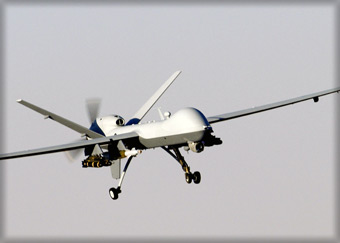High-tech warfare administers death from a great distance.
We heard a lot over the early years of the late (once and future?) War on Terror about weapons of mass destruction, but during that time one small weapon of very specific destruction was allowed to proliferate with little attention. The U.S.-sponsored war of the drones has intensified in recent months, particularly since the Obama administration made a tactical decision to rely even more on the unmanned and now well-armed aerial forces to step up its campaign against Taliban and Al Qaeda elements in Afghanistan and Pakistan.
A lethal campaign piloted like a video game from CIA headquarters now overflies the region. Drones have evolved from eyes in the sky to high-tech sniper scopes with the power to deliver Hellfire missiles on targets far below.
Unfortunately, those targets have included noncombatants. Pakistani authorities have been loudly protesting the increasing pace of drone attacks on tribal territories. The News of Pakistan accused the drone campaign of “perishing 687 innocent Pakistani civilians” in 60 strikes, while by its reckoning taking out 14 wanted Al Qaeda leaders.
During his campaign, candidate Obama spoke of the coming end of Bushness as usual and a renewed respect for international law. Continuing a policy of deploying lethal force outside a recognized combat zone, within the territory of a nation not at war with the United States, and without its consent hardly suggests a change of direction.
While the drone campaign presents the obvious strategic danger of further inflaming anti-American passions in this part of the world—indeed has already done so—the more subtle ethical problems associated with the drone wars have never been suitably explored. Somehow the drones effectively hide the bloody hand of an extra-judicial killing behind their essential technological coolness.
Israel first innovated the use of “targeted assassinations” in an effort to suppress its political and military opponents entrenched in Palestinian communities. These days it is U.S. military strategists who urge an acceptance of such state acts of targeted homicide, but when they began the Israelis at least understood that they were treading on new moral ground.
A retired Israeli army colonel, quoted in The Guardian, spoke frankly about altering boundaries. International law is “based on the notion that an act that is forbidden today becomes permissible if executed by enough countries,” he said. “We invented the targeted assassination thesis, and we had to push it.”
Not exactly a ringing ethical endorsement for droning on. Dissatisfying and even impractical as it may be, the only thoroughly legal response to the tribal-area machinations of Al Qaeda and the Taliban, says Notre Dame law professor Mary Ellen O’Connell, is interdiction in cooperation with Pakistan.
When we cavalierly juggle means and ends—when we, as O’Connell says, try “end runs around international law”—we make decisions that come back to haunt us. “And I have a few words for people who don’t think so,” says O’Connell, “Abu Ghraib and Guantanamo Bay.”
The Obama administration seems determined to join the Israelis’ imaginative renovations of international law. While sincere efforts to limit noncombatant mortality are certainly laudable, the inhuman distance effected by our drone reliance threatens to further numb us to the human toll of this war and future conflict.
Would we feel the same about our targeted assassination policy if it meant sending hit squads into Pakistani villages to pull up-close-and-personal triggers against the heads of our enemies? I doubt it.
Such acts should provoke actual queasiness among U.S. service members and moral nausea among the U.S. general public. The drones, of course, do not suffer from such queasies, and when we turn our God-given judgment over to them, apparently neither do we.
This article appeared in the June 2009 issue of U.S. Catholic (Vol. 74, No. 6, page 46).













Add comment